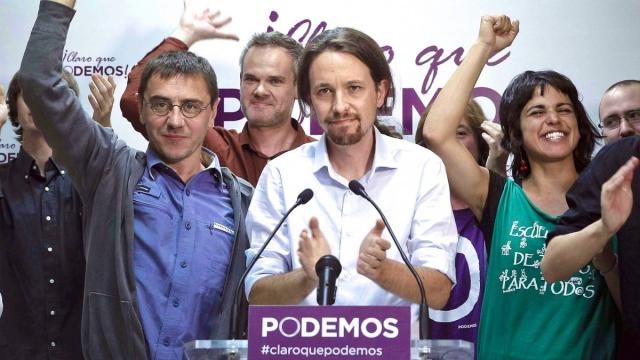
Madrid, Barcelona and other major Spanish cities are now governed by independent citizen fronts called “confluences.” Ahora Madrid, Barcelona en Comú, Zaragoza en Común and La Marea Atlántica (A Coruña) are confluences weaved together by the M15-Indignados social ecosystem.
Other political parties, like Podemos and Equo, have joined these confluences while leaving political party logic at the door. The results from Spain’s latest local elections, which saw the decline of the conservative Partido Popular, have the potential of modifying the course of European politics. Here's why.
The Municipalist Wager
“Whatever may happen in the European [parliamentary] elections will be a warning shot for the municipal elections. This will be a test by fire, for movements whose ambitions are to storm institutions.” This was the pronouncement of Traficantes de Sueños, an influential cooperative, publisher, and bookstore in Madrid, in their May 2014 course Asaltar los cielos. The objective of the course was strategically outlined as: “Brainstorming and designing a municipalist effort capable of encompassing key elements such as how to build true democracy.”
In other words, to plan the leap from the public occupations of squares during M15 of 2011 to political institutions. The challenge was to turn the battle cry “They don’t represent us” into “We represent ourselves.”
The municipalist effort was well underway before the Podemos tsunami – a new political party cobbled together for the European elections of May 25, 2014 – surprisingly gained five seats in European Parliament. Podemos had ruffled some feathers among those who claimed it was hurrying its “assault on institutions” or those frightened by its supposedly aggressive narrative. The day after the elections, as though following a previously laid-out plan, The Municipalist Wager was published by the Observatorio Municipal de Madrid.
The book fleshes out its subtitle (“the political begins with proximity”) with a historical introduction from the Greek agora to the Spanish cantonalismo of the XIX century, passing through the communes and free towns of the Second Spanish Republic, from the Dutch Provo to the German Greens and the Zapatista Councils of Good Government. Published copyleft, the book is more than simply a book; it is a highly adaptable device. The Metropolitan Monitor of Madrid recommended that cities across Spain adapt chapter 4 (focused on Madrid) to their own local context. In the words of Emmanuel Rodríguez, one of the writers of The Municipalist Wager, “The national elections seemed out of our grasp. The municipal elections seemed more approachable, they could be tackled without a centralized party machinery.”
The book concludes with a chapter titled For a Democratic Municipalism, and states: “Democracy loses most of its substance if it doesn’t establish areas for direct decision-making where ordinary people can exercise a certain degree of self-governing.” The challenge was set. The Municipalist Wager was a convergence inspired by EnRed, a proposal drafted in early 2013 by social movements linked to M15 for the open organization of the city of Madrid, adopting free culture and a return to the commons as its guiding principles.
The municipalist effort was also seen as an antidote to the hurricane of Podemos. EnRed is consensus-based with open assemblies and occupied squares, whereas Podemos represents the assault on institutions and political hegemony. The attempt to unite these different socio-political flows was branded “confluence.” A confluence is something very different from a traditional political coalition, a popular front, or a popular unity candidacy. It was something completely new, and non-existent just a year prior.
No one could have imagined that a confluence branded Ahora Madrid would end up displacing the conservative Partido Popular (PP) from Madrid’s city hall. How did this happen? How were these confluences that took power in some of the biggest cities in Spain after the May 24 elections weaved together?
The Electoral Seism
A headline in Le Monde employed the perfect metaphor to describe last month's municipal election results, “Political Earthquake in Spain.” However, it’s impossible to draw a linear interpretation, and simplifying is impossible. Better said, it's hard to find clear winners and losers at first glance. The first contradiction: the conservative Partido Popular, despite being the single party to win the most votes, suffered the greatest defeat. The PP lost its majority in 500 cities, and in almost every major Spanish city including Madrid, Valencia and many other capitals. It lost, in turn, its majority in almost every region, which will now be governed by left wing and/or citizen-led alliances.
The most symbolic loss is found in the Community of Valencia. The two-party system there has been severely shaken – the sum of PP together with Partido Socialista Obrero Español (PSOE), Spain's traditional socialist party, barely reaching a combined 52% of votes – but it survived thanks to rural and elderly voters. The PSOE did not die; it lost votes but it recovered regions like Asturias and Extremadura. The party will govern through agreements in many other regions and cities.
The bigger picture, though, is that Podemos consolidated itself as the third and key political force in the region, despite performing slightly below expectations by only garnering 14% of the vote. Ciudadanos, extolled by the media as the centrist alternative to the “bolivarian” Podemos, failed to take off with under 10% of votes. Where is, then, the great political earthquake evoked by Le Monde? It lays in the results of municipal elections that are defined not so much by who loses but by who wins. The political tremor carried the signature of the confluence – an ecosystem of post-parties that is already assuming governance in some of the countries major cities, from Madrid and Barcelona to Zaragoza, Cádiz and A Coruña among others.
The interpretations of the electoral earthquake are confusing, and often times contradictory. Spanish conservative media mostly ignored the confluence phenomenon, and they continue to affirm that Podemos “has won nothing.” Meanwhile, international media paints it as though Podemos has triumphed in cities like Madrid and Barcelona while crediting Pablo Iglesias, the undeniable leader of the formation, with the municipal success of “the left.”
These media outlets keep defining the municipal confluences as “leftist fronts.” Owen Jones, in his article for The Guardian, recommends that the British left learn Spain: “It’s about attitude and approach, otherwise we are just debating which self-imposed ghetto from which we rant impotently,” he writes.
But everything is more complex and less linear, less dichotomous, than the pundits would have us believe. The left-right axis is not dead, but its grasp on power is slipping. Yet this fact alone cannot explain the emergence of these citizen-driven groups. The confluences, especially in Madrid, cannot be reduced to a “united left front.”
“More complexity, please,” wrote Antón Losada in Spain's El Diario, “after one of the most superficial, frivolous, and simple-minded campaigns in living memory. In the M24 elections people responded by voting for complexity, subtlety and nuances. Facing 'for dummies' type of proposals that compelled people to choose between being 'with me' or 'against me,' voters leaned towards teaching all the candidates and all the political forces that politics must be practiced the same way reality is shaped: diverse, polyhedral and sometimes contradictory.”
Spaniards didn’t massively vote for PP or PSOE. Nor did they exactly vote for the opposite. It’s true, voters turned towards the left, generally speaking, betting on change. But the most important consequence to occur is that the M24 elections disrupted the binary and antagonistic logic of the traditional political system.
The true novelty of the democratic, seismic shift lays in the complex and plural makeup of the confluences. In Valencia, after the election, Valencia en Comú supported Compromís to form a governing coalition that took City Hall. Meanwhile, the confluences are reformulating the governments of the working class belt surrounding Spain's largest cities, Madrid and Barcelona.
A few days after the elections, Pablo Iglesias, in another narrative stroke of his particular Game of Thrones, reminded people that the confluences were also a huge bet for Podemos – and that Podemos is not merely a party but “an instrument for change.” What role did Podemos play in the municipal seism that took place in Spain? How do the citizen confluences like Barcelona en Comú or Ahora Madrid relate to Podemos? What kind of conversation exists between citizens, social movements, M15-Indignados, confluences, and Podemos?
For those answers, stay tuned for Part II of this article which will appear on Friday. Follow the author @bernardosampa.
3 WAYS TO SHOW YOUR SUPPORT
- Log in to post comments












